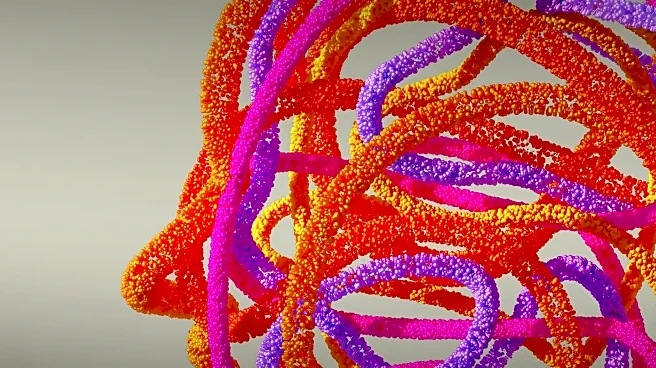What's Happening?
A recent study has demonstrated that boosting levels of nicotinamide adenine dinucleotide (NAD+) can reverse Alzheimer’s-like deficits in animal models. Conducted by an international team led by Evandro Fei Fang from the University of Oslo, the research
focused on the role of NAD+ in correcting errors in RNA splicing, a process crucial for protein production in cells. The study found that NAD+ supplementation improved memory and cognitive function in mice genetically engineered to develop tau-related brain pathology, a characteristic of Alzheimer’s disease. The findings suggest that NAD+ influences the production of a specific protein, EVA1C, which is essential for maintaining neuronal health and correcting splicing errors.
Why It's Important?
The study's findings are significant as they offer a potential new avenue for Alzheimer’s treatment, a disease affecting millions in the U.S. and worldwide. By identifying the molecular mechanisms through which NAD+ exerts its protective effects, researchers can target specific pathways to develop more effective therapies. The connection between NAD+ and RNA splicing provides a clearer target for drug development, potentially leading to treatments that preserve cognitive function and delay the progression of neurodegenerative diseases. This research could pave the way for combination therapies that enhance RNA splicing and improve brain health.
What's Next?
Future research will focus on confirming these findings in human cells and further mapping the precise mechanisms connecting NAD+ to RNA splicing. Researchers may use brain organoids to simulate human brain conditions and explore the therapeutic potential of NAD+ in clinical settings. The study suggests that maintaining NAD+ levels could be a strategy to preserve neuronal identity and delay cognitive decline, prompting further investigation into combination treatments that enhance RNA splicing. The scientific community will likely explore the development of NAD+-based therapies and their application in treating Alzheimer’s and other neurodegenerative diseases.
Beyond the Headlines
The study highlights the importance of understanding cellular metabolism and genetic processing in combating neurodegenerative diseases. By linking NAD+ to RNA splicing and protein management, researchers are uncovering complex interactions that could inform future therapeutic strategies. The ethical implications of advancing treatments for Alzheimer’s are profound, as they could significantly improve the quality of life for patients and reduce the societal burden of the disease. This research underscores the need for continued investment in understanding the molecular basis of neurodegeneration and developing innovative treatments.

















